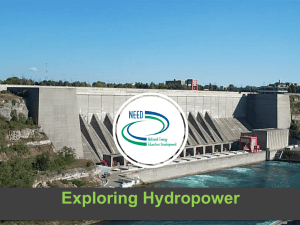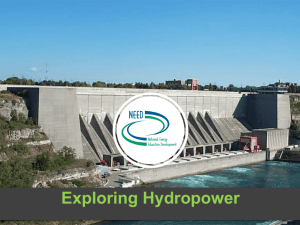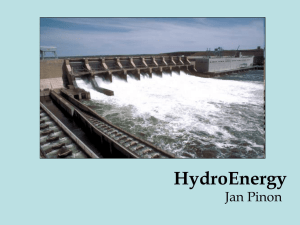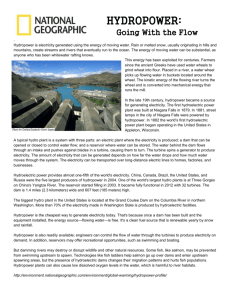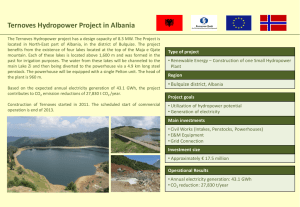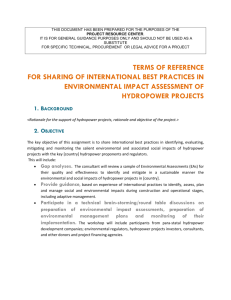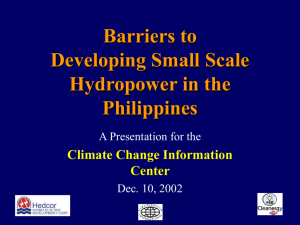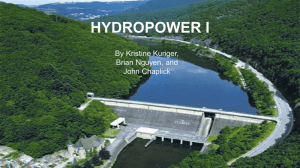Types of hydropower plants
advertisement
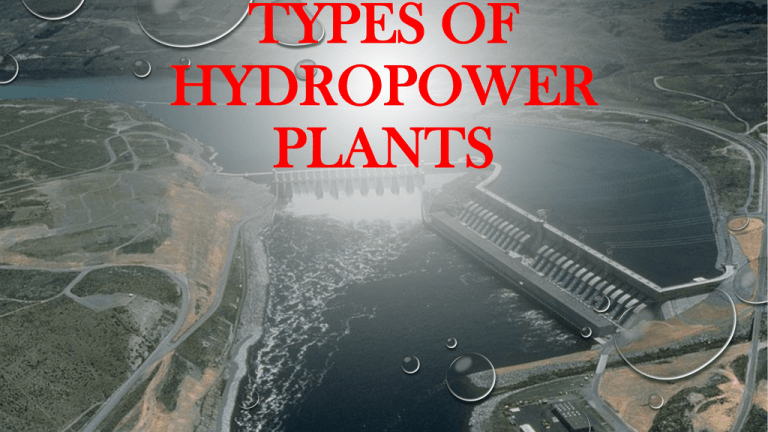
TYPES OF HYDROPOWER PLANTS CONTENTS WHAT IS HYDROPOWER? CLASSIFICATION OF HYDROPOWER PLANTS. SOME FACTS ABOUT HYDRO POWER PLANTS. AGENCIES RELATED TO HYDROPOWER. HYDROPOWER Hydropower transforms the potential energy of a mass of water flowing in a river or stream with a certain vertical fall (termed the “head”) Hydroelectric power is the cheapest source of energy, renewable and environmentally benign during running. The potential annual power generation of a hydropower project is proportional to the head and flow of water CLASSIFICATION OF HYDROPOWER PLANTS : Classification of hydropower plants According to Capacity According to head According to purpose According to facility types According to hydrological relation According to transmission system Large Run-of-River High Single Single purpose Isolated Medium Reservoirs Medium Cascade Small Multi purpose In-stream Mini Micro Pico Low Pumped storage Connected to grid LARGE: >100 MW MEDIUM: 25 – 100 MW SMALL: 1-25 MW MINI: 100 KW - 1MW MICRO: 5 – 100 KW PICO: < 5 KW SMALL HYDRO POWER DEFINITIONS IN DIFFERENT COUNTRIES:COUNTRY NAME SHP (MW) Mauritius ≤ 0.05 Italy ≤3 Dominican Republic, Guatemala, Macedonia Marocco ≤5 ≤8 Afghanistan, Burundi, Iran, Malaysia, Mali, Nepal, Norway, Sri Lanka, Tunisia, Kenya, Uganda, Zambia, Madagascar, Armenia, Austria, Croatia, Montenegro, Nigeria, Turkey, Serbia, Slovenia, Switzerland, Azerbaijan, Cambodia, Philippines, Indonesia, Senegal ≤ 10 Georgia ≤ 13 Bangladesh, Laos, Lesotho, Thailand ≤ 15 El Salvador, Peru ≤ 20 Bhutan, India, Mozambique ≤ 25 Argentina, Brazil, Mexico, Benin, United States Canada, China, Pakistan, New Zealand ≤ 30 ≤ 50 LOW HEAD: Low head hydro power applications use river current or tidal flows of 30 meters or less to produce energy. These applications do not need to dam or retain water to create hydraulic head, the head is only a few meters. Using the current of a river or the naturally occurring tidal flow to create electricity may provide a renewable energy source that will have a minimal impact on the environment. Figure-sectional view of low head hydropower plant MEDIUM HEAD: A power station operating under heads from 30m to 300m. Figure- sectional view of medium head hydropower plant HIGH HEAD: A power station operating under heads above about 300m. A head of 200m/250m is considered as the limit between medium and high head power stations. Figure- high head hydropower plant SINGLE STAGE- When the run off from a single hydropower plant is diverted back into river or for any other purpose other than power generation, the setup is known as Single Stage. CASCADE SYSTEM- When two or more hydropower plants are used in series such that the runoff discharge of one hydro power plant is used as the is a intake discharge of the second hydro power plant such a system is known as CASCADE hydropower plant. Figure-(a) single stage hydropower development scheme (b) cascade or multistage hydropower system SINGLE PURPOSE: When the whole soul purpose of a project is to produce electricity then such a project is known as a Single Purpose Hydro Power Project. MULTIPURPOSE : When the water used in hydropower project is to be used for other purposes like irrigation, flood control or fisheries then such a project is known as Multi Purpose Hydro Power Project. RUN-OF-RIVER TYPE These are hydro power plants that utilize the stream flow as it comes , without any storage being provided. Figure-Run-of-River hydropower plant STORAGE (RESERVOIR) TYPE Hydropower plants with storage are supplied with water from large storage reservoir that have been developed by constructing dams across rivers. Assured flow for hydro power generation is more certain for the storage schemes than the run-of-river schemes. Figure-pumped storage hydropower plant PUMPED STORAGE TYPE Pumped storage type hydropower plants are those which utilize the flow of water from a reservoir at higher potential to one at lower potential. During off-peak hours, the reversible units are supplied with the excess electricity available in the power grid which then pumps part of the water of the tail-water pond back into the head-water pond. Figure-pumped storage hydropower plant IN-STREAM When the velocity of water i.e kinetic energy flowing in the stream is used for conversion into electrical power, then the system is known as Instream. Photograph of In-stream hydro power system ISOLATED: Whenever a hydropower plant is set up in a remote area in order to meet the local demands then such a hydropower plant is known as Isolated System. CONNECTED TO GRID: Whenever the hydropower plant is set up to meet the demands of areas which are at a fair distance from the plant, then the transmission of power takes through the grid system. Such a setup is referred to as Connected to grid. The two largest hydropower projects in the world are the 14 GW itaipu project in brazil and the three gorges project in china with 22.4 GW. These two projects alone produce 80 to 100 TWH/year (IPCC, 2011). The three gorges dam in hubei,china has the world's largest instantaneous generating capacity (22,500 MW). Tehri dam in india on the Bhagirathi 2,400 MW(Current 1,000). Photograph of Itaipu Dam (Paraná River) located on the border between Brazil and Paraguay Photograph of Three Gorges Dam (Yangtze River, china) HYDRO RESEARCH CENTERS • ALPS POWER TECHNOLOGIES (P) LIMITED The company is manufacturing small turbines and genset up to 1000 KW, complete with microprocessor based static excitor system,microprocessor based digital governor, remote operation and telemetry and telecontrol system, chartless recorder for data etc. The company has its own manufacturing and testing facilities at its works, in ghunna industrial area, saharanpur, india • FLOVEL MECAMIDI Flovel mecamidi energy private limited (FMEPL) is a joint venture between flovel MG holdings private limited, india and mecamidi S.A., France. Promoters of flovel MG holdings private limited along with its core team have decades of experience in marketing, design, manufacture, supply, erection, commissioning & servicing of hydro power projects of all types both for local as well as export markets HYDRO RESEARCH CENTERS Karshni Intertech Pvt.Ltd Karshni Intertech Pvt.Ltd is a manufacturer, wholesale supplier, exporter of hydro energy products. Their range of products include hydro energy system components (small), hydroelectric turbines (small), solar charge controllers, water pumping windmills, wind energy system components (large), backup power systems, 100% renewable energy farming , fully integrated systems. Multitek Consortium Multitek Consortium is a hydro energy based company located in Delhi, India. Their range of products hydro energy system components (small), water pumps, turbine machines, gates and hoists, penstock etc. Nagalaxmi Industries Nagalaxmi Industries are manufacturers of industrial structures for thermal, hydel, nuclear power station, food industries, pharmaceutical, chemical, cement etc. SBA Hydro Systems Pvt. Ltd SBA Hydro Systems Pvt. Ltd is a manufacturer, wholesale supplier, exporter of hydro energy products. Their range of products include hydro energy system components (small), hydro energy system components (large), hydro energy systems (large), hydro energy systems (small), hydroelectric turbines (small), hydroelectric turbines (large). APEX BODIES 1) Indian national hydropower association - Faridabad (Haryana) 2) Alternate hydro energy centre- Roorkee (uttarakhand) REFERENCES Www.Eai.In • RENEWABLE ENERGY TECHNOLOGIES: COST ANALYSIS SERIES volume 1: power sector ,issue 3/5, JUNE 2012 http://www.Irena.Org/menu/index.Aspx?Mnu=subcat&primenuid=36&catid=141&subcatid=232 NPTEL Module CE IIT Kharaghpur Chapter:5 Version 2. HTTP://WWW.EAI.IN/REF/AE/HYD/HYD.HTML#STHASH.PVMI3H9C.DPUF
